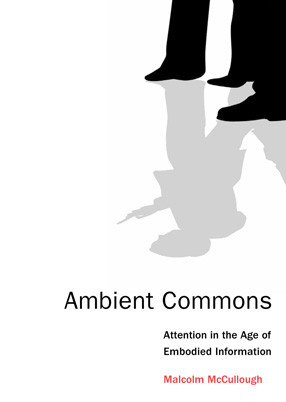Notes on “Ambient Commons”, by Malcolm McCullough

Malcolm McCullough is one the key thinkers and writers about the intersection of the network, digital media, and the urban and architectural. Dan Hill (who will speak here in Torino on Thursday) was asked to provide a testimonial for the back of McCullough’s latest book, “Ambient Commons; Attention in the age of embodied interaction,” which he reproduced on his blog, together with some choice excerpts.
“Ambient Commons is both a timely, if highly civilised, wake-up call and a hugely valuable guidebook to the new post-“digital” landscape of contemporary urban culture.
In suggesting we “take back our attention”, genuinely consider our surroundings, take notice of the world, McCullough argues for a radical rebalancing of our patterns of living, working, playing – not as a refusenik, but as engaged and critical designer and thinker, and backed up by building on a bravura free-wheeling whistle-stop tour through an “environmental history of urban information”.
As physical and digital entwine such that they can rarely be separated, the relationship between disciplines and perspectives becomes increasingly complex and interwoven too. “Ambient Commons” demonstrates how a book can strategically expand the perspective, toolkit and practical vocabulary of the designers, coders and architects who are helping produce the new soft city, but through its open, diverse and richly patterned reference points and positions, it will be engaging and insightful for anyone who wants to understand what’s going on on the street of today and tomorrow.
McCullough also demonstrates how important it is that we understand technology as culture, and that it is worthy of philosophical inquiry. He manages to convey these complex ideas such that they feel accessible, yet are rigorously researched, are instantly appealing, yet prompt considered reflection, stoking the engines on many trains of thought.
It is also, unlike most texts that pivot around technology, beautifully written. It is a critical book to have written at this point.”



